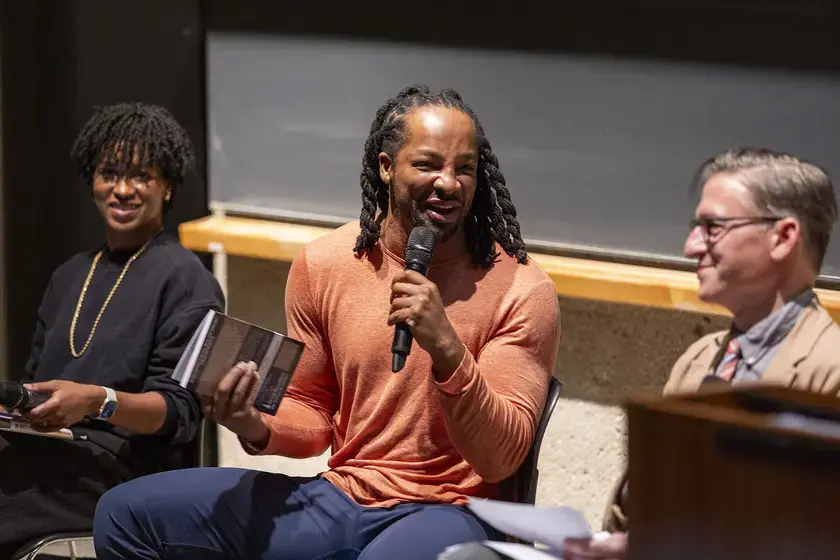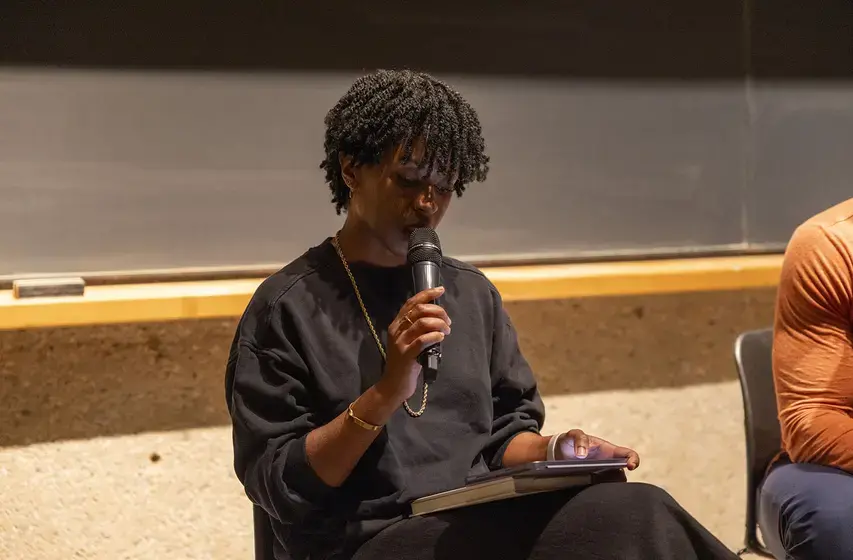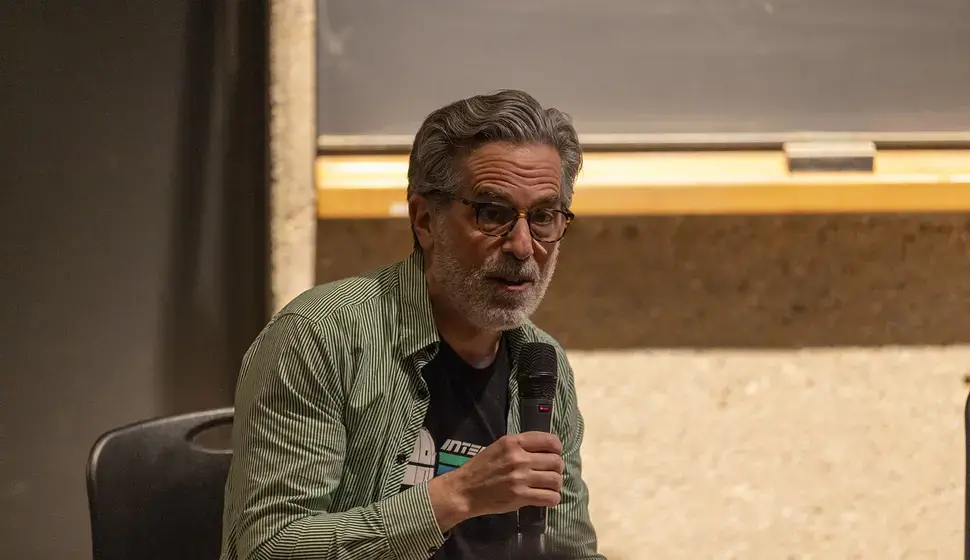Reflections on Reginald Shepherd ’88
Those who knew Reginald Shepherd and those who know his work shared their insights at the 2024 Ben Belitt Colloquium on Arts and Literary Culture.
More than 100 people attended the Ben Belitt Colloquium on Arts and Literary Culture in Tishman Auditorium on Bennington College’s campus on Wednesday, May 15, 2024. Nearly forty more tuned into the live stream online. They were there to learn more about an underrecognized member of the Bennington College literary community in the 1980s: Queer Black poet and essayist Reginald Shepherd ’88.
Reginald Shepherd is one of those rare visionary writers who are not really understood until they are gone, who carry on a conversation with future readership who are prepared to appreciate them more, arguably, than their contemporaries were,” said Benjamin Anastas, Bennington College literature faculty member and the program’s moderator.
Through Anastas’s introduction, members of the crowd (who didn’t already know) learned that Shepherd grew up in poverty in the Bronx. In addition to his bachelor’s from Bennington College, he earned master’s degrees at Brown University and the Iowa Writers’ Workshop. He wrote five collections of poetry, two books of essays, and a blog that helped shape an emerging forum for poetics. He edited two anthologies and won many awards for his work, including the Associated Writing Program’s Award in Poetry and a Silver Medal in the Florida Book Awards.
The evening’s panelists—Pulitzer Prize Winner Jericho Brown, the MacArthur Award-winning novelist Jonathan Lethem ’86, and celebrated poet Camille Rankine—each appreciate Shepherd in different ways. Both Brown and Rankine were deeply influenced as young poets by Shepherd’s work and teach it at Emory University and Carnegie Mellon University, respectively. Brown concentrated at the colloquium on Shepherd’s poems and the controversy that often followed him in life, while Rankine discussed the enduring value of his essays and criticism. Lethem, by contrast, was a classmate of Shepherd’s at Bennington and shared personal insights about him.



The event coincided with The University of Pittsburgh Press’s release of a new collection of Shepherd's poems, The Selected Shepherd, edited by Brown, which was available with the panelists’ books for sale. Brown opened by reading from his introduction to the book.
I was around 24 years old when I first read Reginald Shepherd’s poem ‘Semantics at 4 p.m.’ in an edition of The Best American Poetry edited by Rita Dove,” read Brown. “The poem itself does not identify its speaker as gay, but if there was a queer voice, I believed I was reading it. By turns sassy, ecstatic, elegant, and cosmopolitan in its knowledge, that voice is what led me to read every book and essay the man wrote."
Rankine, an award-winning poet and an assistant professor at Carnegie Mellon University, read from Shepherd’s essay “Notes toward Beauty,” which, in part, posits that beauty presents us with the possibility of things as they should be. She answered with an essay she had written for the event.
“Reading Shepherd’s words,” Rankine read, “I think, if beauty presents to us a vision of a just world, a version of the world where all is right, then perhaps my poetry can stretch towards that, a long arch bending forever toward justice.”
In addition to the themes common in Shepherd’s work—grief for his mother, who died when he was 14; race; and homosexuality—the group discussed how cantankerous he was in his personal and professional life and how changeable he was within his writing.
“He can be contradictory,” said Rankine. “In one poem, he will say one thing and, later, he’ll say the opposite thing… He was very solid and confident in his work, but he was not fixed. He is in constant argument with himself.”
Lethem, one of America’s foremost contemporary writers, has published nine novels, five short-story collections, six non-fiction books, and many essays. He admitted that, knowing Reginald Shepherd as a friend, he felt unprepared to speak about Reginald Shepherd, the poet.
“In the past few months, I have tried to make sense of this invitation [to speak about Reginald Shepherd] by pursuing a concerted study of Reginald Shepherd’s remarkable poetry and prose…In doing so, I have heard his voice both again and for the first time.”
Lethem read from a piece written for the event called “Notes on Reggie,” which included memories of the time they had spent together as friends in Bennington’s well-known places: Canfield living room and VAPA and on the Commons lawn. Twice, Lethem noted Shepherd dancing.
Later, after reading Shepherd’s poem “The Gods at 3 A.M.,” Brown said, “I like in this poem, also, that the speaker is dancing, and you [gesturing to Lethem] were talking about [Shepherd] dancing”
“He loved dancing,” Lethem said.
“I didn’t think about it until you were talking about it,” Brown answered, “As soon as you said it, it became clear to me. Oh—he is always dancing in these poems!”
The event was supported by the Winston Foundation, which also supported the Ben Belitt Undergraduate Writing Prize, given for the first time this year, and the Ben Belitt Distinguished Visiting Writer Jia Tolentino, who taught a class in literary journalism at Bennington this term and who judged the contest. Ben Belitt was a poet and translator who taught at Bennington for more than fifty years, including when Shepherd was a student. The Winston Foundation’s support carries on Belitt’s legacy at Bennington.